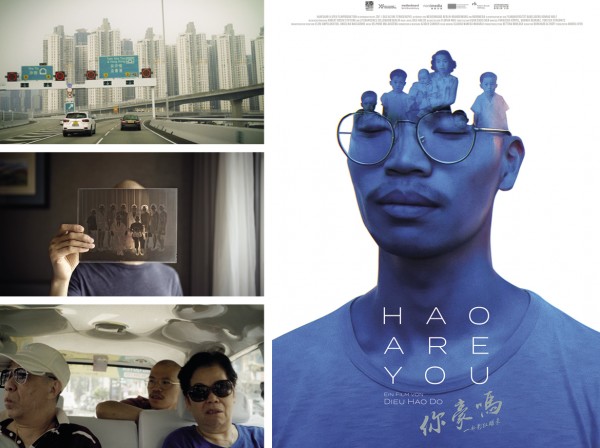-
HAO ARE YOU (Dieu Hao Do 2023)
DIEU HAO DO: HAO ARE YOU (2023)

DIEU HAO DO (CENTER) TALKING TO RELATIVES, LOOKING AT FAMILY PHOTO, ETC. IN HAO ARE YOU
Chasing a diaspora
In this documentary the filmmaker, Dieu Hao Do, who was born and makes his mome in in Germany, presents the fruits of extensive travels and researches into seven members, and hence branches, of his family, whose members fled from Vietnam where they lived as part of the Chinese minority, in 1975, when the south fell to the communists. Do's explorations take him from Germany to Hong Kong, Los Angeles, and back to Vietnam, where family members remain. They all seem to squabble and complain. Largely out of contact with each other now, relations having broken down, they remain angry, nearly a half century later.
His mother blames communism, his uncle an inheritance dispute, the others fall silent. How have traumas from persecution and violence inscribed themselves on the bodies and souls of the survivors and their children? After the Fall of Saigon on April 30 in 1975, more than 1.5 million people fled the communist regime. (Quoting from the blurb.)
Do has noted at the outset that "Germans don't like family stories." The reason: the war. His own family story may not like being told. The Germans he meets "are completely one-dimensional beings who chatter about today, about (…) having children, about designer furniture, the techno hype and the new Vietnamese restaurant around the corner. But they are obviously not interested in yesterday, they do not see themselves as a chain, they do not see themselves as torchbearers of a tradition that goes back in a fascinating way into the past." He seeks to take a different path.
One cannot but admire the alacrity and determination with which the filmmaker, who uses German, Chinese, and English to communicate with relatives, has pursued his researches over three continents with such evidently unenthusiastic interlocutors. But the interviews sometimes are fragmentary, or drastically edited, and after a while, being not very good at keeping family relationships straight at the best of times, inn this overlapping jumble of far flung and disjointed uncles and aunts and cousins, my mind began to glaze over; I lost track, and stopped caring. They became angry loners. Do needed color coding, chapters, or a number system - anything to keep people straight. A diagram would have helped.
Patrick Kittler, a German reviewer, on Kino Zeit, comments of this film: "It is permeated too much by an almost pedagogical distance, and one would have wished that the author's passionate voice could be felt more strongly here. As in the plot of the documentary itself, Do tries so hard to unite all family poles in such an unbiased way that it is not really clear what he actually wants to tell. At some point you lose track of who is at odds with whom, until the documentary becomes almost luridly private." One feels that he needed to connect more closely to any relatives who would let him in, and that he is approachig each one in the same way, like an interviewer, rather than a blood relative. Does he ever find a connection, or is he still seeking it?
The film poster, depicting the filmmaker dyed blue with family members pouring out of his head, is striking and handsome. Do exercises admirable caution in dealing with his older relatives.
Do also contributed to a humorous 2018 web comedy series about the miscellaneous English-speaking Berlin expat population, called "Just Push Abuba."
Last edited by Chris Knipp; 04-09-2024 at 09:15 PM.
 Posting Permissions
Posting Permissions
- You may not post new threads
- You may not post replies
- You may not post attachments
- You may not edit your posts
-
Forum Rules





 Reply With Quote
Reply With Quote
Bookmarks